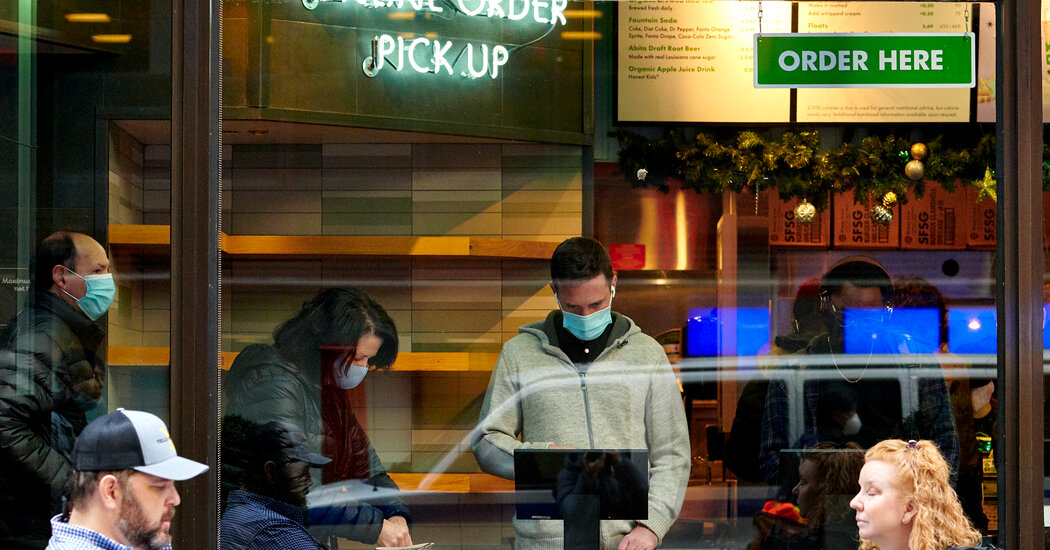New York, New Jersey and Connecticut have all announced plans to loosen certain restrictions, but all of them continue to require masks in some places.
New York, New Jersey and Connecticut are among a number of states nationally that are loosening or ending mask mandates as coronavirus cases fall precipitously from their recent peaks. On Wednesday, Gov. Kathy Hochul of New York announced that a statewide mask or proof of vaccination mandate for all indoor public locations would be allowed to expire on Thursday. But it is not time to put away those masks completely.
Each of the three states, as well as New York City and other cities and towns in the region, continue to require masks in some places. And federal rules still require masks on all forms of public transportation and in transportation hubs, including in subway stations, bus terminals and airports, at least until March 18.
Where is a mask still required in New York City?
New York City, once the epicenter of the pandemic, has had more stringent masking rules in place than many other parts of the country. Governor Hochul’s announcement lifts some, but not most, of those restrictions, taking New York back to the masking rules that were in effect before the Omicron surge began in December.
Masks will still be required in New York City while riding public transportation, including when taking car services and taxis. They will still be required when inside a school, in a child care or a health care setting, and at group residential facilities such as nursing homes and homeless shelters.
In addition, owners of stores, restaurants, theaters or other public spaces are still permitted to require masks. In Broadway theaters, for example, both masks and proof of vaccination will continue to be required at least until April 30.
Restaurants, gyms, museums and other indoor cultural and entertainment venues are required to ask for proof of vaccination under a policy known as “Key to NYC.” That policy remains in effect. In these venues, masks can come off if the owners or venues permit it. But in practice, many cultural venues do require masks in addition to vaccination proof.
So what is new? You can now take off your mask again in stores, pharmacies, offices, hotel lobbies and supermarkets, if the owners of those businesses permit it. The same goes for offices: If your office allows you to go mask-free for part or all the time, you may.
But there is a big caveat: If you are unvaccinated, you must still wear a mask whenever you are in a public space, according to city regulations. About 86 percent of adult New York City residents, and 76 percent of residents of all ages, are fully vaccinated.
Where are masks required elsewhere in New York State?
Like New York City, New York State has had multiple mask mandates in place through much of the pandemic. Many of those rules remain in place.
Masks are still required in health care and adult care facilities, nursing homes, in homeless shelters and in correctional facilities when social distancing is not possible. Masks are also still required in all schools serving students from pre-K to 12th grade.
While she said she was not yet ready to lift the school mask mandate, which is based on a regulation that is set to expire on Feb. 21, Governor Hochul said Wednesday that schools would distribute at-home test kits before the upcoming midwinter break to help gauge infection levels.
She said she would make a decision about the mask rules upon students’ return to school, by the first week of March, and that she would base it on data.
“This fight is not over,” she said, “but the trends are very, very positive.”
Following federal rules, masks are also required on public transportation and in train stations, airports and other transport hubs. And localities and businesses are also free to impose their own mask requirements.
But in locations where they do not, masks can come off. That includes movie theaters, bowling alleys, stores, restaurants and offices, if the owners and localities allow it.
There is also no longer a state requirement to show proof of vaccination before masks can be removed. Localities may continue to set vaccination requirements, however, and businesses throughout the state may continue to ask for proof of vaccination.
What are the mask rules in New Jersey?
Gov. Philip D. Murphy of New Jersey said this week that he would lift a mask requirement for students and school employees, effective March 7. The change also applies to day care centers and preschools, where children 2 and older have been required to wear masks as well.
The Coronavirus Pandemic: Key Things to Know
Some mask mandates ending. Several states in liberal-leaning parts of the U.S. are quickly moving away from mask requirements as the Omicron wave recedes, but the Centers for Disease Control and Prevention said it was not ready to change its guidance in regards to masks.
At that point, local school districts will be free to decide whether to require masks. In a sign of how contentious the issue of masks in school has become for some of them, the New Jersey Department of Health urged schools to discipline any students who bully peers who continue wearing masks after the mandate is lifted.
“Schools will not be permitted to bar the use of facial coverings by individuals and will be expected to take disciplinary action in instances of bullying should they arise due to an individual’s choice to continue wearing a mask,” the Health Department said in a news release.
Unlike New York, New Jersey did not require masks in public indoor spaces statewide during the recent Omicron surge, although masks are still required on public transportation and in health care facilities.
A number of jurisdictions have gone further, imposing their own indoor mask requirements, although some of those are now being lifted, in Hoboken, for example.
In Newark, a mask requirement is in effect when indoors at “any public facility.”
And what about in Connecticut?
In Connecticut, Gov. Ned Lamont has recommended lifting a statewide mandate requiring masks in schools and child care centers on Feb. 28, at which point local jurisdictions could decide what to do for themselves.
But there is a wrinkle. Some of the governor’s pandemic authority to issue public health rules is set to expire before then, after Feb. 15. Many of the governor’s executive orders — including the one that provides the basis for the school mask requirements — will lapse on that date if the Connecticut General Assembly does not act.
Also set to expire after Feb. 15 is an order by Gov. Lamont that mandates masks for unvaccinated people in a larger range of indoor settings, beyond schools. Specifically, the rule requires people ages 2 and up who are not fully vaccinated to wear a mask indoors in a public place if they are unable to keep “a safe social distance of approximately six feet from every other person.”
The governor’s office recently gave the legislature a list of executive orders he recommends extending past Feb. 15.
Michael Gold contributed reporting.


























